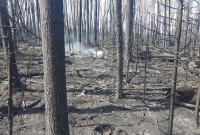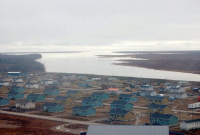I was driving into Ottawa for an assignment, listening to the news on the radio when a message came in for me from the newsroom.
"Alex, can you go check out the flood zones? There's one close by in Gatineau."
It has been an exceptionally rainy month of April so far in the national capital region. When you combine it with all of the melting snow, the Ottawa River is reaching levels that local residents say they haven't seen in decades.
And while I know that individual weather events can vary, there's no denying that these sorts of events are becoming more frequent because of our changing climate.
"Depending on where you are along the Ottawa River... some levels have not been seen in the previous 40 years. But in other areas, it's in the previous 15," Manon Lalonde, an executive engineer with the Ottawa River Regulation Secretariat, was saying in an interview with CBC Radio's Hallie Cotnam.
There were areas flooded just a few kilometres from Parliament Hill on the Quebec side of the river. That includes areas just west of Gatineau, in the Pontiac region as well as on the east in municipalities that are further away such as Saint-André-Avellin and Rigaud in Quebec.
As of Friday morning, Rigaud, a municipality about 45 minutes west of Montreal, had declared a state of emergency with flooding that was affecting over 300 homes.
A bit closer to Ottawa, I decided to head out to Boulevard Hurtubise, on the east side of Gatineau. I heard on the radio newscasts that city crews were springing into action and starting a voluntary evacuation of the area.
Locally, Radio-Canada was reporting that about 80 homes were affected. The city set up a shelter at a local community centre.
City officials also told Radio-Canada that about 30 homes had water damage and at least four households needed to be relocated and offered assistance by the Red Cross.
Getting on site to capture images was trickier than expected. Many of the roads leading to Boulevard Hurtubise were also flooded, and I drive a small car.
It also quickly dawned on me that I was not prepared for a flood zone, as I did not even have rain boots with me when I left for the other assignment that morning. After trying my luck in the deepest waters this little car had ever been in, I did manage to reach the site where the city had set-up a Société de Transport de l'Outaouais (the local transit agency) bus to transport evacuees.

From there, the road along the river was closed. The Gatineau fire department crews were going in with pick-up trucks to assist citizens that needed help and city crews were bringing in sandbags. I was able to walk a few hundred metres to the first area where the road was submerged, but being bootless and unprepared, I had to retreat.

That's when I ran into the fire crew from a local station, "Caserne #4 Jean-Claude-Charbonneau." They introduced me to their chief, of operations, Gilles Vekeman.
I asked them if I could tag along on their next patrol of ground zero, promising not to interfere with their work. The chief agreed, and off I went with firefighters Éric Séguin and Marc-Antoine Poissant in a much more capable truck than my compact car. They were on a mission to help a local resident who was unable to make it back home on his own.

By this time it was already passed noon, and the water levels appeared to be dropping. Residents had their fingers crossed that the rain would be held at bay on this cloudy day. Still, as the truck was wading through water on the road, of which some chunks had been washed away, we saw some sights you don't always expect to see on your daily commute.

We eventually reached our destination and the firefighters dropped him off while I took a few more pictures.
Eventually, we made our way back. I could tell that the municipal workers, the police and firefighters, were motivated to lend a hand — even for those who had started work shifts at 5 p.m. the day before.
The Caserne 4 crew got together for a quick group picture before I went off.

The Quebec government has announced that up to 72 municipalities will be eligible for financial aid this year for the spring flooding that's occurring. While the river appears to be receding, some local residents do not think they are out of the woods yet as there is still much snow left to melt in the northern regions of the Ottawa River basin.
Anyone looking for information or assistance from local municipalities can consult the Gatineau city website here or the city of Ottawa's local website over here.
Here are more images of the flooding.

















Comments